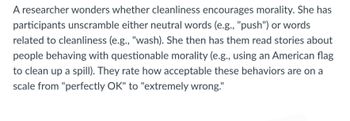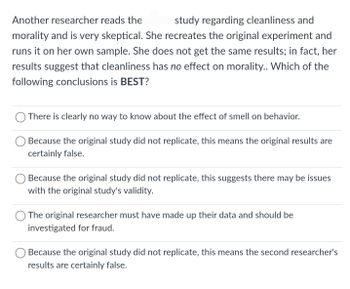
I am a little confused on this question , please help! please don't just list the answers , if you can explain how you got your answer that would be great. Thank you for your help.
I have attached the problem .Please view both attachments before answering.


1. There is nothing related to smell in either of the two studies. So this has to be false.
2. Failure to replicate does not necessarily mean that the original results are false. Maybe the replication results are false. Or maybe there are issues with validity.
3. This seems most appropriate. An example of a validity issue is that the sample in the original study was not diverse enough. Let's say that the original author only recruited American participants. Then, the results of the original study might not hold true for Chinese participants.
4. Again, see (2).
5. This is the opposite of (2). Failure to replicate does not necessarily mean that the replication results are false. Maybe the original results are false. Or maybe there are issues with validity.
Step by stepSolved in 2 steps

- I keep getting stuck trying to solve this please helparrow_forwardI'm stuck on figuring out how to do this problem correctly. Please helparrow_forwardhello, I appreciate your answer but the answer looks funny it is difficult to understand. Would you please rewrite the answer in a way I can understand? Thank you.arrow_forward
- I am not quite sure what you did in this question even though the answer is right. Is it possible to use a pen instead of typing ? That can be a great help. Thanks.arrow_forwardPlease double check answer. It is wrong or im not understanding the answer writtenarrow_forwardCan you help me with Practice Problem, Thank you.arrow_forward
 MATLAB: An Introduction with ApplicationsStatisticsISBN:9781119256830Author:Amos GilatPublisher:John Wiley & Sons Inc
MATLAB: An Introduction with ApplicationsStatisticsISBN:9781119256830Author:Amos GilatPublisher:John Wiley & Sons Inc Probability and Statistics for Engineering and th...StatisticsISBN:9781305251809Author:Jay L. DevorePublisher:Cengage Learning
Probability and Statistics for Engineering and th...StatisticsISBN:9781305251809Author:Jay L. DevorePublisher:Cengage Learning Statistics for The Behavioral Sciences (MindTap C...StatisticsISBN:9781305504912Author:Frederick J Gravetter, Larry B. WallnauPublisher:Cengage Learning
Statistics for The Behavioral Sciences (MindTap C...StatisticsISBN:9781305504912Author:Frederick J Gravetter, Larry B. WallnauPublisher:Cengage Learning Elementary Statistics: Picturing the World (7th E...StatisticsISBN:9780134683416Author:Ron Larson, Betsy FarberPublisher:PEARSON
Elementary Statistics: Picturing the World (7th E...StatisticsISBN:9780134683416Author:Ron Larson, Betsy FarberPublisher:PEARSON The Basic Practice of StatisticsStatisticsISBN:9781319042578Author:David S. Moore, William I. Notz, Michael A. FlignerPublisher:W. H. Freeman
The Basic Practice of StatisticsStatisticsISBN:9781319042578Author:David S. Moore, William I. Notz, Michael A. FlignerPublisher:W. H. Freeman Introduction to the Practice of StatisticsStatisticsISBN:9781319013387Author:David S. Moore, George P. McCabe, Bruce A. CraigPublisher:W. H. Freeman
Introduction to the Practice of StatisticsStatisticsISBN:9781319013387Author:David S. Moore, George P. McCabe, Bruce A. CraigPublisher:W. H. Freeman





